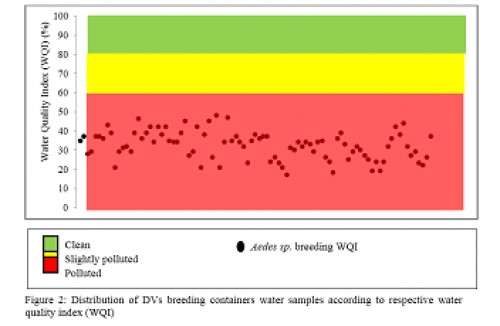Water quality characteristics of dengue vectors breeding containers
Author(s): Nazri Che Dom, Muhammad Faiz Madzlan, Siti Nur Anis Hasnan, Nurlisa Misran
Abstract: Dengue fever is an infectious mosquito borne disease and continues to be one of the most important public health problem. To date, the most widely used method to prevent dengue outbreak is attacking the mosquitoes breeding site. This study was to assess the water quality conditions of the breeding containers which may affect the oviposition preferences of dengue vectors (DVs) mosquitoes. An ecological study was conducted on the species distribution of the DVs mosquitoes with the water quality condition of the breeding containers. The most efficient container types for DVs mosquitoes are container identity 9 (CID9 = Le: 12.98) and followed by the groups of tyres (CID6 = Le: 11.21), which are the most productive container types. Both efficient breeding container types had moderately turbid water, and contaminated with the manifestation of algae. All water samples (n=91) collected were tested for physicochemical parameters and was further analyzed using water quality index (WQI) in order to assess the water quality of the breeding containers. The adaptation to poor and polluted water quality in dengue vectors mosquito larval habitat is related to pollutant from domestic and industrial exposure. Most mosquito species examined appear to breed effectively from this kind of habitat and further research on their adaptation must be done in the future.
 Fig.:
Fig.: Distribution of DVs breeding containers water samples according to respective water quality index (WQI)
How to cite this article:
Nazri Che Dom, Muhammad Faiz Madzlan, Siti Nur Anis Hasnan, Nurlisa Misran. Water quality characteristics of dengue vectors breeding containers. Int J Mosq Res 2016;3(1):25-29.



